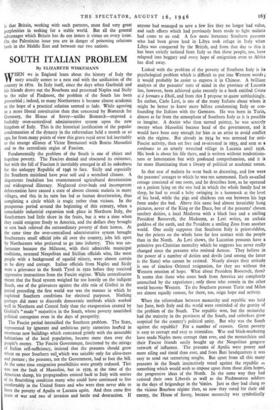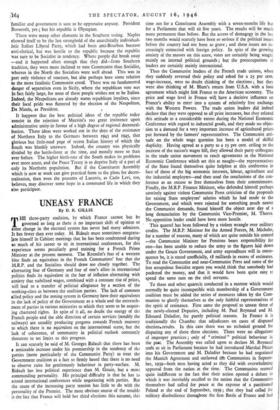SOUTH ITALIAN PROBLEM
By ELIZABETH WISKEMANN
WHEN we in England learn about the history of Italy the story usually comes to a neat end with the unification of the country in 1870. In Italy itself, since the days when Garibaldi and his friends drove out the Bourbons and presented Naples and Sicily to the ruler of Piedmont, the problem of the South has been proverbial ; indeed, to many Northerners it became almost academic as the hope of a practical solution seemed to fade. While agreeing to a more liberal constitution than that concocted by Bismarck for Germany, the House of Savoy—unlike Bismarck—imposed a foolishly over-centralised administrative system upon the new kingdom of Italy. This is the historical justification of the popular condemnation of the dynasty in the referendum held a month or so ago, for from many points of view this grave royal error led inevitably to the strange alliance of Victor Emmanuel with Benito Mussolini and to the centralistic orgies of Fascism.
Fundamentally the problem of the South is one of abject and hopeless poverty. The Fascists denied and obscured its existence, but with the fall of Fascism it inevitably emerged in all its nakedness for the unhappy Republic of 1946 to face. Sicily and especially the Southern mainland have poor soil and a wretched climate. A degenerate feudalism has countenanced agricultural deterioration and widespread illiteracy. Neglected river-beds and incompetent deforestation have caused a state of almost chronic malaria in many villages, and this in its turn has led to human deterioration, thus completing a circle which is tragic rather than vicious. In the prosperous period around the beginning of this century, when a remarkable industrial expansion took place in Northern Italy, the Southerners had little share in the fruits, but it was a time when they could emigrate freely to America, and the dollars they brought. or sent back relieved the extraordinary poverty of their homes. At the same time the over-centralised administrative system brought Southerners small official jobs all over the country, jobs left open by Northerners who preferred to go into industry. This was un- fortunate because the Milanese, with their admirable municipal traditions, resented Neapolitan and Sicilian officials who, like most people with a background of squalid niisery, were almost certain to be dirty and corrupt. Italian officials from Naples and Sicily were a grievance in the South Tyrol in 1920 before they received oppressive instructions from the Fascist regime. While centralisation meant that the fiscal system weighed far too heavily on the indigent South, one of the grievances against the able rule of Giolitti in the period preceding the first world war was the manner in which he exploited Southern conditions for electoral purposes. Nothing perhaps did more to discredit democratic methods which worked well in Northern and Central Italy than the exasperation created by Giolitti's "made" majorities in the South, whose poverty nourished political corruption even in the days of prosperity.
The Fascist period intensified the Southern problem. The State, represented by ignorant and ambitious party careerists houted in enormous new buildings which contrasted grimly with the miserable habitations of the local population, became more than ever the people's enemy. The Fascist Government, fascinated by the mirage of Italian self-sufficiency, insisted that the peasants should grow wheat on poor Southern soil which was suitable only for olive-trees and pasture ; the peasants, not the Government, had to foot the bill. At the same time emigration possibilities were greatly reduced. This was not the fault of Musiolini, but in 1929, at the time of the American slump, his propagandists enticed back to Italy with stories of its flourishing condition many who could have continued to live comfortably in the United States and who were then never able to leave the poverty of Apulia or Lucania again. And then came five Years ot war and two of invasion and battle and destruction. If anyone had managed to save a few lire they no longer had value, and such efforts which had previously been made to fight malaria had come to an end. A few more fortunate Southern peasants who had been given land in Libya took refuge in Italy when Libya was conquered by the British, and from that day to this it has been strictly isolated from Italy so that these people, too, have relapsed into beggary and every hope of emigration even to Africa has died away.
Linked with the problem of the poverty of Southern Italy is its psychological problem which is difficult to put into Western words ; it would probably be easier to express it in Chinese. A brilliant analysis of the peasants' state of mind in the province of Lucania has, however, been achieved quite recently in a book entitled Cristo si e fermato a Eboli, and from this I propose to quote unblushingly. Its author, Carlo Levi, is one of the many Italians about whom it might be better to know more before condemning Italy or con- founding the Italians with the Germans. He was born in Turin, almost as far from the atmosphere of Southern Italy as it is possible to imagine. A doctOr who then turned painter, he was scarcely • twenty when Mussolini became head of the government, and it would have been easy enough for him as an artist to avoid conflict with the regime. But already in z934 he was arrested for anti- Fascist activity, then set free and re-arrested in 1935, and sent as a confinato to an utterly wretched village in Lucania until 1936. His book is about his life there, and is written without tendentious- ness or lamentation but with profound comprehension, and it is far more illuminating than a library of political or academic tomes.
In that seat of malaria he went back to doctoring, and few were the peasants' cottages to which he was not summoned. Each so-called cottage consisted of one room, and he describes how, as he operated on a patient lying on the one bed in which the whole family had to sleep, he had to avoid a baby swinging in a hammock at the level of his head, while the pigs and chickens ran out between his legs from under the bed. Above this same bed almost invariably hung pictures, never of the King or the Duce, but of the peasants' chosen tutelary deities, a local Madonna with a black face and a smiling President Roosevelt, the Madonna, as Levi writes, an archaic 'goddess of the earth, and the President a smiling Zeus from another world. One easily supposes that Southern Italy is priest-ridden, but the priests on the whole have far less contact with the people than in the North. As Levi shows, the Lucanian peasants have a primitive pre-Christian mentality which he suggests has never really changed since the peasants who resisted Aeneas. They believe in the power of a number of deities and devils (and among the latter is the State) who cannot be resisted. Nearly always their attitude is one of timeless Oriental resignation, for they are without the Western emotion of hope. What about President Roosevelt, then? It seems that those who come back from America are completely untouched by the experience ; only those who remain in the other world become Western. To the Southern peasant Turin and Milan are almost equally remote, for there, too, reign hope and activity.
When the referendum between monarchy and republic was held last June, both Italy and the world were reminded of the gravity of the problem of the South. The republic won, but the monarchy had the majority in the provinces of the South, and onlookers grew sceptical for the country's political unity. But why was the South against the republic? For a number or reasons. Great poverty is easy to corrupt and easy to intimidate. War and black-marketing have made Naples more corrupt than ever, and the monarchists and their Fascist friends easily bought up the Neapolitan gangster network of influence. The peasants of Apulia were poorer and more ailing and timid than ever, and from Bari headquarters it was easy to send out terrorising toughs. But apart from all this many peasants in the South instinctively voted against the republic as something which would wish to impose upon them those alien hopes, the progressive ideas of the North. In the same way they had resisted their own Liberals as well as the Piedmontese soldiers in the days of brigandage in the 'sixties, just as they had clung to the vicious Bourbon regime then, so now they voted for their old enemy, the House of Savoy, because monarchy was symbolically 'familiar and government is sure to be oppressive anyway. President Roosevelt, yes ; but his republic is Olympian.
There were many other elements in the Southern voting. Naples showed itself to be the last stronghold of the anarchically individual- istic Italian Liberal Party, which had been anti-Bourbon because anti-clerical, but was hostile to the republic because the republic was sure to be Socialist in tendency. Where people did break away —and it happened often enough that they did—from Southern tradition, they were more inclined to vote Communist than Socialist, Whereas in the North the Socialists were well ahead. This was in part only violence of reaction, but also perhaps bore some relation to the more fatalistic Communist creed. There was no fundamental danger of separatism even in Sicily, where the republican vote was In fact fairly large, for none of these people wishes not to be Italian. indeed, the Neapolitans are already warm republican loyalists, since their local pride was flattered by the election of the Neapolitan, De Nicola, as President.
It happens that the best political ideas of the republic today consist in the rejection of Mazzini's too great insistence upon administrative unity,in favour of a high degree of regional decentral- isation. These ideas were worked out in the days of the resistance of Northern Italy to the Germans between 1943 and 1945, that glorious but little-read page of recent Italian history of which the South was blankly unaware. Indeed, the country was physically divided by the battle-front at the time, and morally more so than ever before. The higher birth-rate of the South makes its problems ever more acute, and the Peace Treaty is to deprive Italy of a part of only its Northern population. But if the Constituent Assembly which is now at work can give practical form to the plans for decen- tralisation, then even the peasants of Lucania, as Carlo Levi, too, believes, may discover some hope in a communal life in which they also participate.



























 Previous page
Previous page